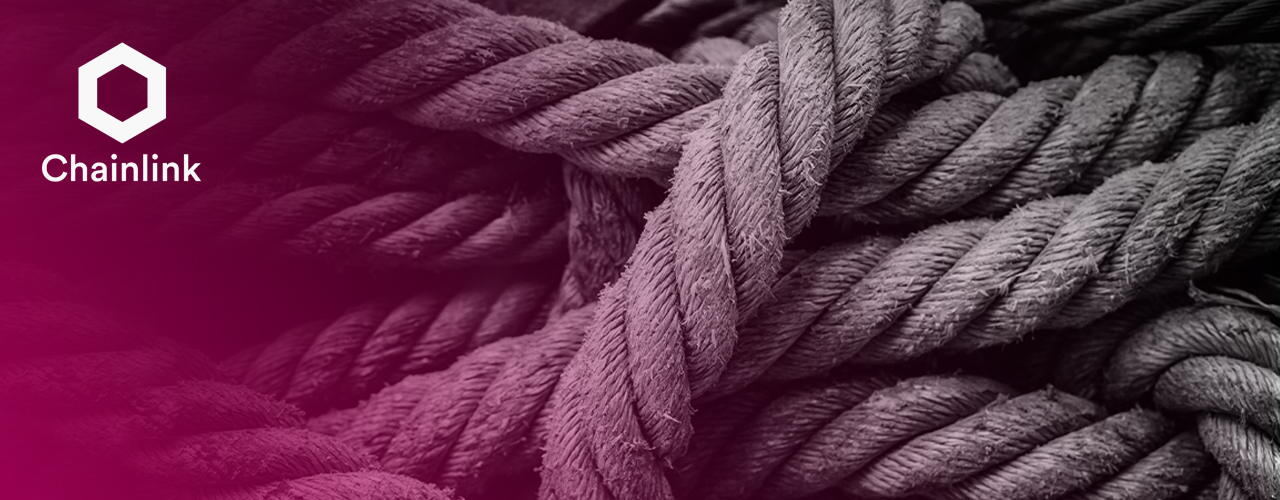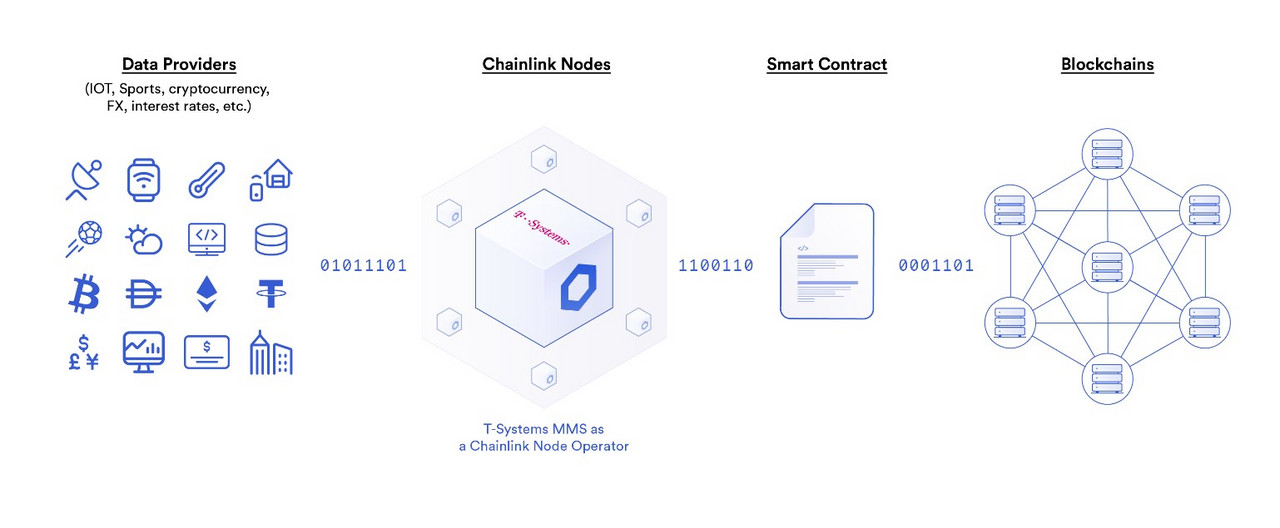
Smart contracts made reliable and useful with real-world data
As a Node Operator, T-Systems MMS ensures the reliable connection of external data to smart contracts and earns digital assets for doing so
Processes in the globalized, digital economy require the cooperation of many actors. With the help of blockchain technology, processes can be automated, and workflows can be designed more cost-efficiently. Smart Contracts are used as digital contracts whose contract terms are represented by a program code to automate and facilitate these processes. However, as soon as external, trustworthy data is required to process smart contracts, the possibilities are limited. This especially applies to sensitive and rapidly changing data such as asset prices and IoT sensor data.
By using oracles, verified external data can now be linked to a smart contract. This opens up new possibilities: For example, verified real-time securities or commodity prices can now be integrated into a blockchain solution. Smart Contracts can thus react to the verified price and take the value into account when trading between assets. Another conceivable application is the evaluation of sensor data for blockchain applications in the Internet of Things (IoT). In production, a smart contract could use the verified information to determine that machine maintenance is necessary and interact directly with the maintenance companies.
Chainlink provides access to off-chain data feeds, Web APIs and traditional bank payments for Smart Contracts using a decentralized oracle network. We at T-Systems MMS have joined the Chainlink network as a Node Operator. By operating a Chainlink node, T-Systems MMS will provide reliable real-world data to Chainlink network users and decentralized applications (dApps) on Ethereum, further supporting the vision of public blockchains as a foundation for numerous use cases such as Decentralized Finance (DeFi).

Real-World Data for Smart Contracts in Business and DeFi
One of our goals at Blockchain Solutions Center of T-Systems Multimedia Solutions is to facilitate real-world adoption and advancement of blockchain technology. For blockchain use-cases or applications to be meaningful, they have to interact with the real world outside the blockchain (off-chain). This involves observing the events happening off-chain and making decisions based on those events.
Securely connecting the on-chain and off-chain worlds is one of the key challenges for public and enterprise blockchains. As more economic activity and value migrate on-chain, this problem becomes even more pressing. It is essential not only to enable smart contracts to “talk” with the real world but also to ensure that the off-chain data and its delivery on-chain is highly reliable. This “oracle problem” has been extremely pronounced in various use-cases (e.g. supply chain), where even though the blockchain is a tamper-proof environment for processing the smart contract, the off-chain data triggering it can be manipulated. Bad data inputs lead to bad smart contract outputs, thus eliminating the core value proposition of blockchain technology.
Public blockchain networks can guarantee the validity of transactional data via decentralized consensus and a set of crypto-economic incentives. Chainlink applies decentralization and crypto-economic incentives to creating oracles - secure middleware that allows blockchains to bidirectionally communicate with off-chain systems.
Due to the decentralized structure of Chainlink’s oracle solution and the incentives tied to its provisioning, the developer and user of a smart contract can rely on the off-chain data supplied by the Chainlink Network. We at T-Systems Multimedia Solutions want to strengthen the network with our professional infrastructure, as well as monetize the data we provide through it via a native digital asset of the network.
The Role of Telecommunication Companies in Staking and DeFi
Public network infrastructure provisioning has been the core business model of telecommunications companies for decades. It began with providing core infrastructure for telephony in the form of telephone towers and masts, and later to Web 2.0 infrastructure in form of optic cables and data centers. Supporting Web 3.0 public network infrastructure in the form of nodes, validators, orchestrators, transcoders, witnesses, and block producers is the next milestone for us.
By providing real-world data into the Chainlink network, T-Systems MMS engages in a form of infrastructure provisioning also known as “Generalized Mining”, where it provides an IT service to a blockchain network while getting rewarded in digital assets for reliably doing so. As the value locked on the application level such as DeFi is significant, such IT services play an important role in the overall Ethereum ecosystem.
By applying our secure infrastructure expertise to operating a Chainlink Node, we can thus indirectly participate in the growing DeFi and Staking space. This is the first step in our secure blockchain infrastructure provisioning project. "Chainlink is the first public blockchain network to which we are currently providing infrastructure and will provide staking services in the future. This brings us a lot closer to our vision of establishing public blockchains as the basis for numerous use-cases", says Dr. Andreas Dittrich, Head of Blockchain Solutions Center of T-Systems Multimedia Solutions. We will be supporting the Chainlink Network with secure infrastructure and with its planned staking implementation in the future.